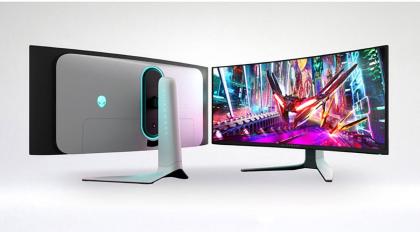Samsung Display reports $6.3 billion in revenue in Q1 2022
Samsung Electronics reported its financial results for Q1 2022. Revenues hit a new record of 77.78 trillion Won ($61.2 billion USD) and the operating profit was 14.12 trillion Won ($11 billion USD).

Samsung Display's revenues were 7.97 trillion Won ($6.3 billion USD) with an operating profit of 1.09 trillion Won ($900 million USD). Samsung says its mobile display earnings improved from 2021, led by strong demand for OLED smartphone displays and growing adoption of OLED displays in laptops and gaming devices.
Samsung's laptop OLED displays receive UL's halo-free certification
Samsung Display announced that its OLED displays for laptop applications has received 'Halo Free' verification from the safety science leader, UL, for its glare-free and sharp picture quality.

Samsung explains that LCD displays suffer from light-blurring which occurs when the outline of a bright subject appears white on an image with sharp contrast. This is because even with local dimming, LCDs cannot adjust the backlight brightness exactly on the edge. OLEDs, with their self-lit pixels, do not suffer from this.
Samsung Display starts installing equipment at its 6-Gen A4-2 AMOLED production line Asan
Reports from Korea suggest that Samsung Display is starting to install production equipment in its new 6-Gen AMOLED fab in Asan. The A4-2 line (previously called the A4-E line) is a converted old LCD fab(L7-2) that was closed in early 2021. It is estimated that the A4-2 line will cost around $800 million USD. Samsung hopes to start production in the new production line by Q3 2022, and monthly capacity will be 12,500 substrates.
It is estimated that the A4-2 line will cost around $800 million USD. Samsung hopes to start production in the new production line by Q3 2022, and monthly capacity will be 12,500 substrates.
Samsung Display's managed to increase its QD-OLED production yield to 75%
Samsung Display recently started producing QD-OLED panels (for TV and monitor applications), and according to earlier reports, the production suffered from low yields, estimated at around 30-50% a few months ago.
In a move that is thought to reassure SDC's employees, the company announced on its internal bulletin board that it has managed to increase its QD-OLED production yields to 75%, and it now aims to increase that to 90% or higher.
Samsung aims to reduce the thickness of its future QD-OLED panels by removing the QD glass substrate
According to reports in Korean media, Samsung is developing a new process which will allow it to reduce the thickness of its QD-OLED panels.

The current QD-OLED design uses two glass substrates, one for the TFT backplen (and the OLED frontplane materials), and one for the QD conversion layer. The new plan is to remove the QD glass substrate, and inkjet print the QDs directly on the OLED TFE encapsulation layer.
Samsung Electronics plans to use more OLED panels produced in China in 2022
Last year Samsung Electronics started to adopt AMOLED displays produced by BOE and TCL, as the Korean smartphone makers aims to lower costs and reduce its reliance on Samsung Display.

According to a report from Korea, the company plans to increase these China-produced OLED orders from around 800,000 in 2021 to around 6.5 million in 2022. It seems the main device to adopt these panels will be the Samsung Galaxy A73.
SDC and Anoto to develop smart pens for foldable OLED displays
Smart pen developer Anoto Group announced that it has been commissioned to develop a digital screen pen for Samsung Display's foldable OLED screens for mobile phones, tablets and PCs. SDC will pay Anoto for the pen development (which will be finalized by the end of 2022) and will also pay royalties to Anoto as SDC will produce the pen itself.

Anoto explains that established screen pen solutions cannot be used with foldable OLED displays due to their thinness and size. Anoto says that its proprietary dot pattern technology and pen are uniquely suitable for foldable displays.
Do Samsung's new QD-OLED panels suffer from color inaccuracies?
Products with Samsung's QD-OLED panels are now hitting the market, led by Dell's Alienware AW3423DW gaming. A German magazine reviewed the 34" monitor, and discovered an issue with color inaccuracies.

As you can see in the photo, when there's a change from a dark color to a bright color, the display shows green lines that should not be there.
Samsung launches three new AMOLED phones, the A33, A53 and the A73
Samsung announced three new Samsung Galaxy phones, in its popular mid-range A-series. First up is the Galaxy A33 which features a 6.4" 90Hz 1080x2400 Super AMOLED display, and the second is the Galaxy A53 which features a larger 6.5" 120Hz 1080x2400 Super AMOLED display.

Most interesting is the Galaxy A73,which sports a 6.7" 120Hz 1080x2400 Super AMOLED+. It is not clear what Samsung refers to as a Super AMOLED+, it could be a non-pentile display like the old Super AMOLED Plus displays.
Korea media reports that Chinese display makers are stepping up efforts to recruit Korean OLED experts
An interesting post from Business Korea says that Chinese OLED display makers are stepping up efforts to recruit OLED experts from Korea.
The Chinese companies, supported by the local governments, are specifically targeting managers in LG Display and Samsung Display, offering increase in salaries sometimes up to 5X or even 10X and free residence and flight tickets. The government in China is also supporting the local display industry with large subsidies to decrease fab construction costs.
Pagination
- Previous page
- Page 22
- Next page

